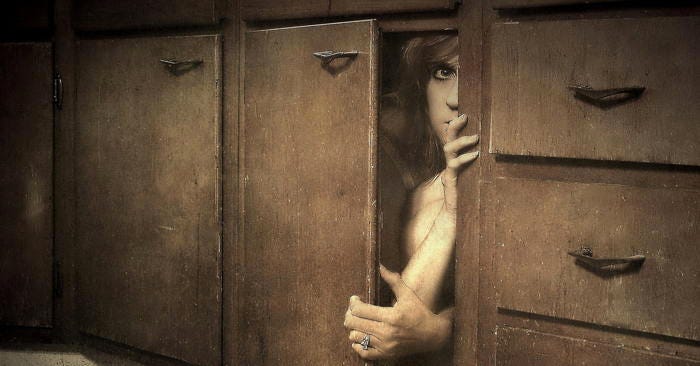Maya Angelou commented about one kind of 'inner stuff’ we may face: the insecurity many of us experience:
“I have written eleven books, but each time I think, ‘Uh oh, they’re going to find out now. I’ve run a game on everybody, and they’re going to find me out.’”
Used in my post: Gifted and Talented but Insecure.
It is at least a little reassuring to know accomplished writers and other artists can experience these imposter feelings, and still keep on creating.
One of the enduring ideas about developing creativity is to that creative people such as writers need to "get out of their own way" so they can more freely express their inner experience.
It is also potentially a core benefit of counseling or psychotherapy. But what does that really mean: Getting out of our way?
Dennis Palumbo, a writer and a therapist specializing in creative issues, addresses the question:
"If I, the writer, get out of my own way - that is, put my 'stuff' aside so I can write - what's left to write about? My stuff is the raw material of my writing.
“In fact, I'll go out on a limb and just say it: There is nothing but stuff. Which is great, because that means I'll never run out of raw material. As long as I'm a human being, I have an inexhaustible supply."
He goes on to note that this does not refute the idea that "the most important thing a writer has to do is get out of his or her own way" - because "a writer who invites all of who he or she is into the mix - who sits down to work engulfed in stuff, yet doesn't give these thoughts and feelings a negative connotation; who in fact strives to accept and integrate whatever thoughts and feelings emerge - this writer has truly gotten out of his or her own way."
From his book Writing from the Inside Out: Transforming Your Psychological Blocks to Release the Writer Within.
~~~~~
Creativity coach and therapist Eric Maisel notes that a writer's inner life is not "something that anyone else is privy to, unless and until the writer wants to share it.
"It is a private, secret hotbed of activity, an unruly, unquiet, unholy cauldron bubbling with the best and the worst thoughts a person can think."
And this inner 'cauldron' can be a source of emotional turmoil for the writer, "because she is continually buffeted and transformed by an inner life invisible from the outside.
"She may speak to her mate in complete sentences about what her day was like, but inside another life is being lived, one full of beauties and monstrosities, upheavals and transgressions."
But even if the writer "safely contains that inner reality - sublimates her urges, controls her thoughts, manages her monsters - it nevertheless remains alive inside of her, always ready to produce the next book or sorrow, the next meaning spark or meaning crisis."
From his book Living the Writer's Life.
~~~
Janet Fitch teaches creative writing, and is author of White Oleander and Paint it Black among others.
She notes,
"Depression, suffering and anger are all part of being human. Even though it's painful to go through these things, for the writer, it's essential."
And, she adds, "Anytime you work with materials that are deep parts of yourself, you feel revulsion at showing things about yourself that you don't want people to know… You have to work as deeply as you can to give the reader something worth reading, but you're also showing things about yourself that you're not pleased with."
[From Janet Fitch interview by Mary Curran-Hackett, Writer's Digest.]
~~~
That also relates to exploring and creatively using our shadow self.
See my article Owning Our Shadow Self - includes audio podcast excerpt from a free 3-part video series by Sounds True with Caroline Myss and Andrew Harvey: The Sacred Path of the Shadow.
~~~~
I appreciate Palumbo's idea of not giving a negative connotation to our stuff. I referred above to "emotional turmoil" - which has a somewhat critical tone.
We could, for example use the word "teeming" - as in Jane Piirto's book "My Teeming Brain: Understanding Creative Writers."
She notes the title comes from the Keats sonnet. "When I have fears that I may cease to be / before my pen has gleaned my teeming brain..."
From her article Themes in the Lives of Successful U.S. Adult Creative Writers, republished years ago on one of my sites, so some links may be bad.]
A final quote, from Eric Maisel:
A writer's inner life matters: it is hard to imagine that anything matters more.
~~~





